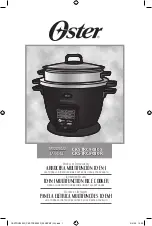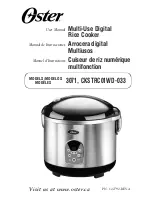
EN 11
USE
Ovenware
• In principle, you can use any type of heat-resistant ovenware.
• Do not rinse glass ovenware with cold water immediately after use. The sudden temperature
difference can cause the glass to crack.
• Use black or dark baking tins. These conduct heat better and allow the food to cook more
evenly.
Do not cover the oven floor
• Covering the oven bottom with, for example, aluminium foil or a baking tray can lead to
overheating and damage to the enamel.
• It is possible to prevent spring forms from leaking onto the oven floor by folding a container
out of aluminium foil and placing it on the grid under the form or by laying baking paper
under it.
Roasting meat
• Large pieces of meat, from 1 kg, are the most suitable. The meat will get a regularly shaped,
crispy crust, with virtually no weight loss.
• Rub the meat with salt and spices fifteen minutes beforehand. Use 80 to 100 g of butter or
fat (or a mixture of the two) per 500 g of meat for roasting.
Cooking times
• Flat, thin pieces require approximately 5 minutes less cooking time than thick or rolled
pieces of meat. When cooking larger pieces of meat, cook for 15 to 20 minutes longer per
500 grams extra.
• Put the meat in a roasting pan and douse in hot butter or fat. Place the meat in the roasting
pan with the fatty side facing up. Make sure to baste meat without a fatty side every
15 minutes.
• Meat with a fatty side should be basted every 30 minutes.
• If the gravy is too dark, add a few spoonfuls of water now and then during roasting.
• Cover the meat loosely with foil and let it stand for 10 minutes before serving.












































